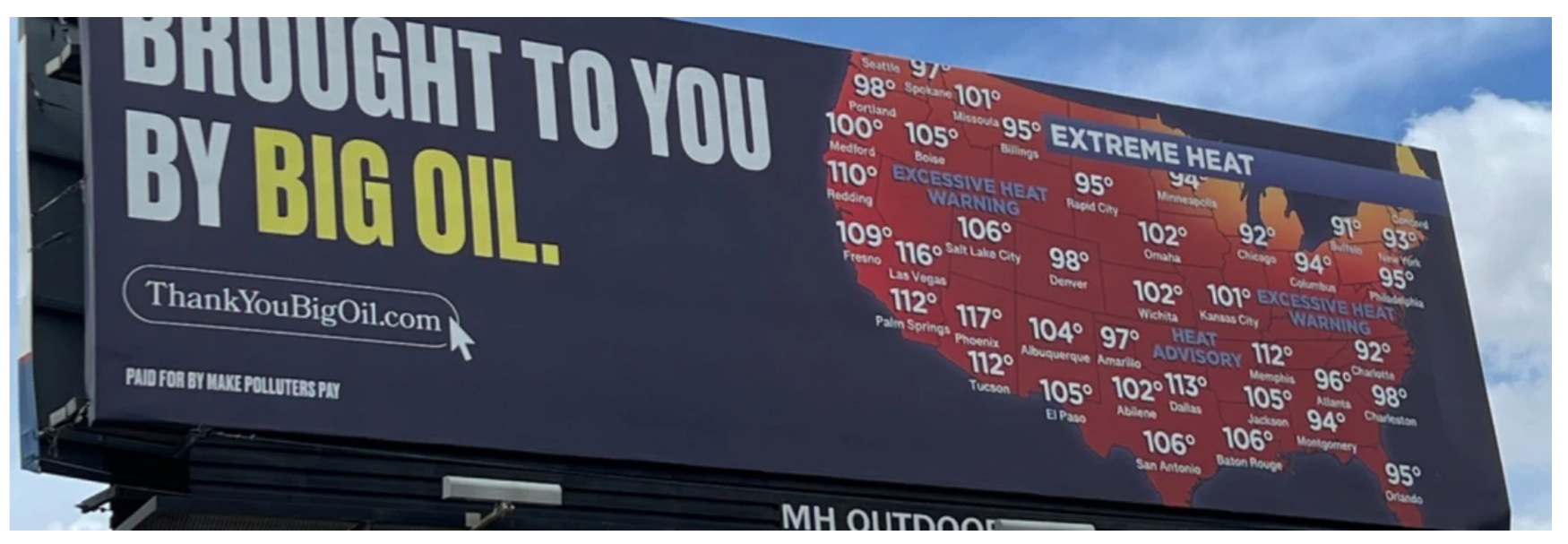
Last Updated on: 31st May 2025, 10:36 am
Julie Leon, age 65, was found unresponsive in her car in Seattle on June 28, 2021. Later that day, she died and emergency medical workers found her internal temperature was 110º F. This week, her daughter, Misti Leon, filed a wrongful death lawsuit in Superior Court for King County in the State of Washington. The suit seeks to hold a number of oil companies responsible for her mother’s death.
On the day Julie Leon died, the Pacific Northwest was experiencing a heat dome — a blast of hot air that lay over the region like a pall. On that day, the temperature in Seattle reached 108°F — the highest ever recorded for the city. An attribution study released shortly after the event by a team of climate scientists claimed the 2021 heat dome would have been “virtually impossible without human-caused climate change,” according to a report by NPR.
The lawsuit names a number of oil companies as defendants, including ExxonMobil, BP, Chevron, Shell, ConocoPhillips, various sundry subsidiaries of those companies, and Olympic Pipeline Company. As part of the complaint, the attorney for Misti Leon claimed:
“Defendants understand the risks of their fossil fuel products, but many ordinary consumers do not. For decades, Defendants have concealed their knowledge of and deceived the public about these risks, hooking consumers on fossil fuels without their understanding or consent to the risk of harm to themselves, others, and the planet. This multi-decade campaign of deception has been wildly successful.
“Because consumers do not understand the severity and breadth of the risks posed by fossil fuel products, they have participated in an economy dependent on them. And when a tragedy like Julie’s death results from the prolific use of fossil fuels, it is easy to dismiss the misfortune as an accident rather than a foreseeable consequence of Defendants’ deception. Through affirmative misrepresentations and omissions, Defendants have made trillions of dollars and escaped accountability for their actions.”
What is unique about this lawsuit is that it is brought by one individual against some of the wealthiest and most powerful corporations in the history of the world. Up until now, suits against Big Oil have mostly been brought by cities, counties, or states seeking to recover damages for the costs of protecting against rising sea levels and similar infrastructure expenses. A few suits by mostly young plaintiffs have sought to force Big Oil to clean up its messes. But never before in the US has anyone sued the oil companies for causing the death of a single individual.
Douglas Kysar, faculty director of the Law, Environment, and Animals Program at Yale Law School, told NPR this lawsuit stands out from other climate cases that are working their way through the courts. “The advantage of this lawsuit is that it puts an individual human face on the massive harmful consequences of collective climate inaction. Not only that, the complaint tells a story of industry betrayal of public trust through the eyes of a particular person.”
Oil Companies And State Courts
Those of you who are not legal scholars may not appreciate the strategic advantages of suing in state court rather than federal court. One of the most important for plaintiffs like Misti Leon is that state courts generally allow for much broader discovery — the pretrial process that requires both sides to disclose documents, memos, transcripts, research, or recordings that may be relevant to the case.
There are other advantages as well. Juries in state courts have more freedom to award damages as they deem appropriate, for example. And then there is the biggie — no review by a politically motivated Supreme Court in Washington, DC, dominated by ideologues handpicked by the fossil fuel industry. As a group, those companies know eventually one of these federal lawsuits is going to be successful and they have moved heaven and earth to make sure they have judges who are on their side when crunch time arrives.
There is another unusual aspect to this case. It is not a criminal case but rather a civil matter. In the State of Washington, juries in civil cases that involve claims of more than $100,000 are tried by a jury of 12 people. But unlike in a criminal trial in which the jury must reach a unanimous verdict, a civil jury must only get 10 of the 12 jurors to agree on a verdict.
In addition, the standard of proof is the preponderance of the evidence, not beyond a reasonable doubt. Legal scholars have written millions of words about that distinction, but in general, a preponderance of the evidence means 51 percent whereas beyond a reasonable doubt is closer to 90 percent or higher, depending on who you ask.
Misti Leon will only need to convince ten Washingtonians, tried and true, that it is more likely than not the oil companies are responsible in some degree for Julie Leon’s death. Once that happens, the door will be wide open to truly historic damages. A jury in a civil case can only do two things — award monetary damages to cover actual losses and assess punitive damages. There is no limit on either award except for a judge’s inherent power to limit awards that are manifestly unjust.
The Power Of Punitive Damages
For those who may not be familiar with the idea of punitive damages, here is a primer from Wikipedia. “Punitive damages […] are assessed in order to punish the defendant for outrageous conduct and/or to reform or deter the defendant and others from engaging in conduct similar to that which formed the basis of the lawsuit. Although the purpose of punitive damages is not to compensate the plaintiff, the plaintiff will receive all or some of the punitive damages awarded.”
It goes on to say that punitive damages are appropriate “if the defendant’s conduct was egregiously insidious.” Personally, I cannot think of anything that could more “egregiously insidious” than the conduct of a fossil fuel industry that has had actual knowledge of the harm their products do for over 50 years and engaged in an active campaign of lies and deception to keep that information from becoming public knowledge.
In addition, they have deliberately twisted whatever information that did become public to make it seem unreliable or tainted by what the current head of the EPA calls a “climate change religion.” For a reaction to that insanity, please see the response from Mark Z. Jacobson of Stanford University.
True to that script, Theodore Boutrous, a lawyer for Chevron, criticized the lawsuit. In a statement to NPR, he huffed, “Exploiting a personal tragedy to promote politicized climate tort litigation is contrary to law, science, and common sense. The court should add this far-fetched claim to the growing list of meritless climate lawsuits that state and federal courts have already dismissed.” We can only wonder what the highly paid lawyer would say if it were his mother who died during the oppressive heat wave. Though, if he talks down to a jury like that, that will be a huge help to the plaintiff ‘s case.
Executives in the walnut paneled boardrooms at these companies must be gobbling antacid tablets about now. They are in a major jackpot here and they know it. When a jury hears about all the lies and deceitful tactics they have employed for the past 50 years or more, it could conceivably vote to punish them with punitive damages of millions or even billions of dollars.
Their friends in DC won’t be able to help them, the oil-soaked stooges on the Supreme Court won’t be able to help them, and the failed president won’t be able to pardon them. They will be at the mercy of ten ordinary people who happen to live in and around Seattle — and their carefully constructed protective cocoon of compliant government administrators, members of Congress, presidents and judges won’t be able to protect them.
We can’t wait to see these corrupt, prevaricating corporations get the comeuppance they so richly deserve. Does that make us partisan? Oh, you betcha!

Sign up for CleanTechnica’s Weekly Substack for Zach and Scott’s in-depth analyses and high level summaries, sign up for our daily newsletter, and follow us on Google News!


Whether you have solar power or not, please complete our latest solar power survey.
Have a tip for CleanTechnica? Want to advertise? Want to suggest a guest for our CleanTech Talk podcast? Contact us here.
Sign up for our daily newsletter for 15 new cleantech stories a day. Or sign up for our weekly one on top stories of the week if daily is too frequent.
CleanTechnica uses affiliate links. See our policy here.
CleanTechnica’s Comment Policy


